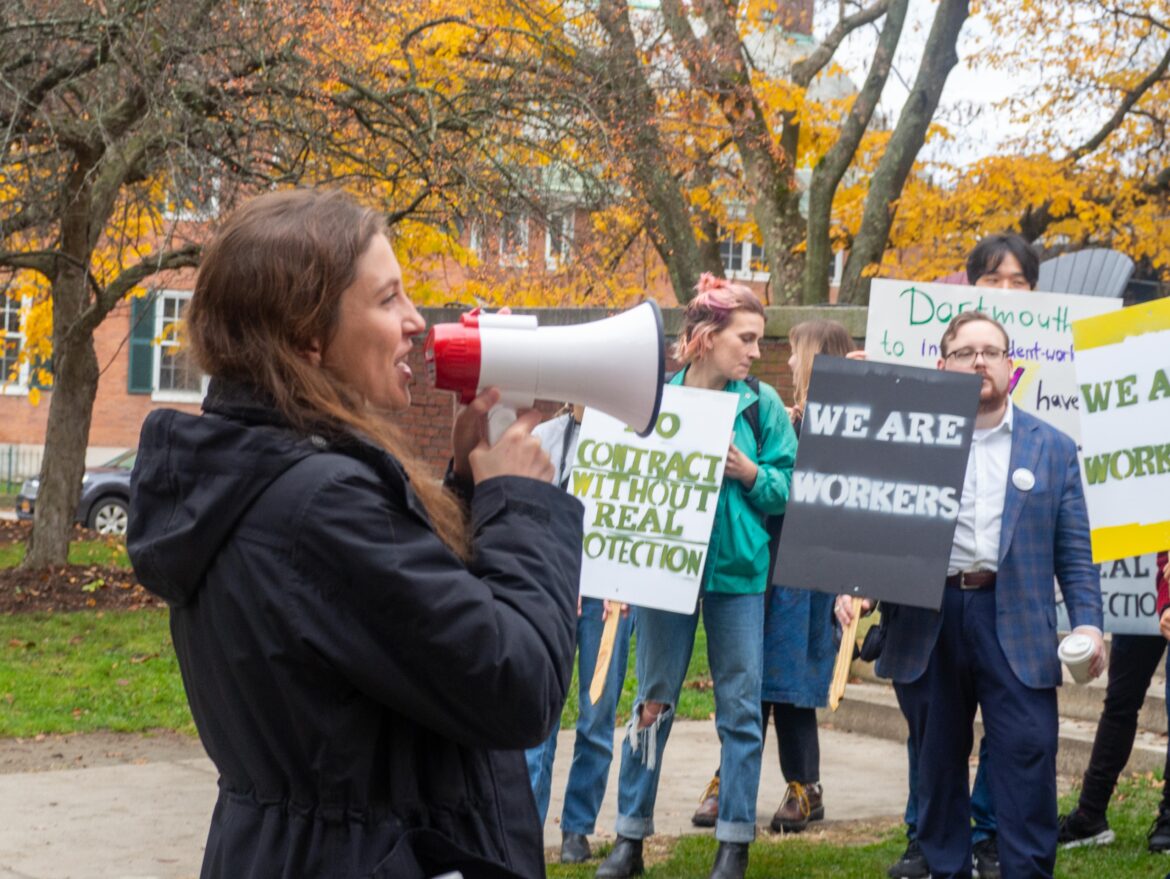
Above, Dartmouth grad students and supporters rally in front of Collis Center on Thursday. ARNIE ALPERT photo
By Arnie Alpert, Active with the Activists
Arnie Alpert spent decades as a community organizer/educator in NH movements for social justice and peace. Officially retired since 2020, he keeps his hands (and feet) in the activist world while writing about past and present social movements.
HANOVER—Tension between the roles of graduate students as workers and scholars continues to play out in negotiations between Dartmouth College’s administration and a union representing the college’s graduate students. The two parties held their seventh bargaining session Thursday, where according to union representatives talks centered on policies governing mistreatment of graduate students by the faculty.
Holding signs saying, “We Are Workers,” 50 members and supporters of Graduate Organized Labor at Dartmouth, known as GOLD-UE for its affiliation with the United Electrical Workers union, rallied in front of the Collis Center before the negotiating session.
According to Genevieve Goebel, a member of the union negotiating team, “The common thread is that we just want protection from unfair treatment and recourse if we receive unfair treatment. And right now, we’re running into a wall with the college.” The college says its internal policies are adequate, according to Goebel, but “the unfortunate thing about those is that they’re not enforceable. So, we want to make them contractually obligated to provide us these protections. We think that’s perfectly reasonable.”
The union says it wants a “just cause” standard for disciplinary actions taken against its members. “Their argument is essentially that faculty have a right to discipline and dismiss graduate workers without just cause due to academic freedom,” the union said in a statement released after the bargaining session. “Our union is determined to push the envelope on this matter. We are making an intentional effort to set a new standard in our contract language because we believe that graduate workers should be treated as real workers. This is arguably the primary struggle of our sector in the labor movement during this moment.”
Economic issues, including compensation and transportation, have not yet come up in bargaining between GOLD-UE and the administration. “We’re saving those for the end,” Goebel said.
Dartmouth College spokesman Diana Lawrence said: “Dartmouth is fully supportive of the graduate students in our community. We are also committed to working with GOLD-UE in the collective bargaining process to come to a mutually beneficial agreement that covers the terms and conditions of GOLD-UE members’ employment.”
Negotiators also touched on treatment of discrimination, which the union says should be included in the contract. According to the union statement, the college insists any allegations of discrimination should be handled through its Title IX office, not through a contractual grievance procedure.
The union formed in 2021 and received formal recognition following an April 13, 2023 election supervised by the National Labor Relations Board. Negotiations for its first contract began in August. In February, a separate union representing undergraduate workers won a contract including a $21 an hour base wage.
Speaking through a megaphone during the rally, union activist David Freeman said union organizing among graduate students has “exploded across the country in recent years.”
“We are workers, and they cannot deny us our rights and protections that all workers deserve,” said Freeman, who is pursuing a degree in mathematics. “We demand meaningful and enforceable workplace protections for ourselves and for our coworkers.”
Union members and supporters chanted, “What do we want? A fair contract,” and other slogans.
Rendi Rogers, a PhD student in microbiology, said the purpose of the rally was to demonstrate the strength of the union beyond the members on the bargaining team. “It’s not just the seven of us on the bargaining committee here, saying that we need this,” she said. “Our members deeply feel that they need real protections in the contract that we can enforce.” More than a dozen rank-and-file union members attended the bargaining session as observers, she said.
It wasn’t just members of GOLD-UE in front of Collis Thursday. Several community activists were there, too, as were representatives of three other Dartmouth unions. Roan Wade, who said she was recently elected secretary of the Student Worker Collective at Dartmouth, the undergrad union, said, “We’re really proud of the contract that we negotiated. And I think it shows that when workers unite that we have power collectively. And we stand in complete solidarity with GOLD, and we hope to support them in any way we can.” Wade added that the Collective is aiming to expand its ranks beyond the dining hall workers included in its first contract.
Daniel Abasso works at the college library, where he’s a member of the college’s newest recognized union, which represents librarians and is affiliated with the American Federation of State, County, and Municipal Employees. They won their union election in June and will start negotiations soon, he said. Their big issues are pay and benefits, due to the high cost of living in the Upper Valley. Holding a sign and standing with two other librarians he said, “We’re just out here to support GOLD today.”
Cost of living is a huge issue in the community. According to the latest survey by NH Housing, Grafton County, which includes Hanover and Lebanon, has the most expensive rental housing in the state, with a median of $2081 a month for a two-bedroom apartment. To be affordable, that requires an income in excess of $83,000, an amount which is nearly twice the county’s median income for renters.
Chris Peck, president of Local 560 of the Service Employees International Union, said his members have to drive farther and farther to get to their blue-collar jobs at Dartmouth College and the Hanover Inn. That will no doubt be an issue animating their own contract talks in the coming year. Peck, who has worked at Dartmouth for decades and led the union since 2016, said he’s “a little surprised” at the upsurge in union organizing on campus. Even the college basketball team is seeking union recognition as members of Local 560, he said.
Goebel, a fifth year PhD student in Ecology, Evolution, Environment and Society, wrote in April that she joined the union largely because of the high cost of housing. “Though I’m fortunate to be advancing in my career, my living conditions have only worsened over the past four years. I’ve had to remain in the same apartment because finding better, more affordable places to live is nearly impossible. At the same time, my rent has increased by $300 per month, while my pay has not kept pace,” she wrote in an article for The Daily Dartmouth, where she also cited the region’s inadequate public transportation.
Transportation is an especially big issue for international students, according to Rendi Rogers. “Many of our international workers do not move here with a car or have a U.S. driver’s license,” she said in an email message.






